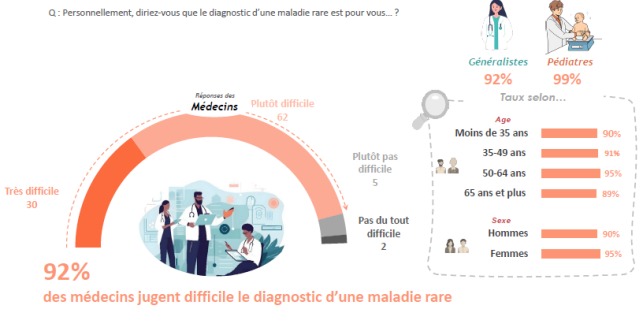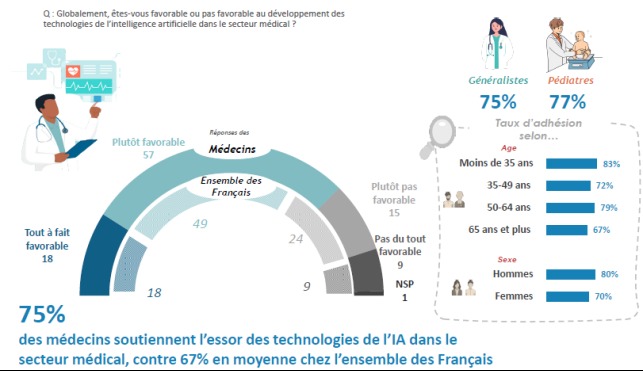Published on
Updated
Reading 2 min.
In the field of rare diseases, Artificial Intelligence could provide a real boost and reduce diagnostic error. Doctors’ views are changing on this subject, as demonstrated by an IFOP study.
It fascinates as much as it scares us a little, but artificial intelligence could greatly improve the care of patients with rare diseases. On the occasion of International Rare Disease Day, a SANOFI/IFOP study reveals how this is understood by doctors themselves. Aware of the potential of this aid, they have much less hesitation than the general public.
A diagnosis difficult to establish which would benefit from AI
Thus, almost all of the 600 general practitioners and pediatricians surveyed (92% and 99% respectively) declare that the diagnosis of rare diseases is difficult.

However, it is not excluded since 3 million French people are affected by one of the 7,000 diseases described today. 45% of doctors, or almost half, have already been involved in the diagnosis of one of these diseases.

Faced with these difficulties, 3 out of 4 doctors (73%) would like to benefit from better support for the diagnosis and treatment of rare diseases. And 75% support the rise of AI in the medical sector (compared to 67% of the general population).
AI would allow more personalized monitoring according to the medical profession
Less cautious than the French population, two out of three doctors would therefore say they are ready to use AI tools in the future, particularly in the use of decision-making algorithms (44%), automated interpretations (43%) and therapeutic decision assistance (40%). And only 26% of doctors see AI as a threat to their work.
In addition, 81% of doctors consider that the use of AI could help improve the diagnosis of rare diseases. 74% of them believe that this is likely to improve the quality of life of patients by providing them with personalized medical monitoring;
Furthermore, 78% of general practitioners and 85% of pediatricians declare that they could use at least one technology (such as medical imaging analysis, medical data analysis, differential diagnosis assistance or genomic sequencing) for the diagnosis of a rare disease.
Soon a French solution to assist doctors
Based on this observation, and on the occasion of International Rare Disease Day, Sanofi and the French start-up MIS (Medical Intelligence Service) announce the official launch of accelRare®. This “Made in France” solution uses the artificial intelligence of the MedVir tool, a class I medical device in Europe of which MIS is the manufacturer. Its aim is to accelerate the pre-diagnosis of 270 rare diseases with treatment or support.
“After 2 years of development, we are proud to make accelRare available to doctors® to accelerate the diagnosis of patients affected by one of the 270 rare diseases for which treatment exists. We hope that our solution based on artificial intelligence will support doctors in their practice and will change the lives of patients through faster diagnosis.” rejoices Isabelle Vitali, Digital Innovation Director, Sanofi.
